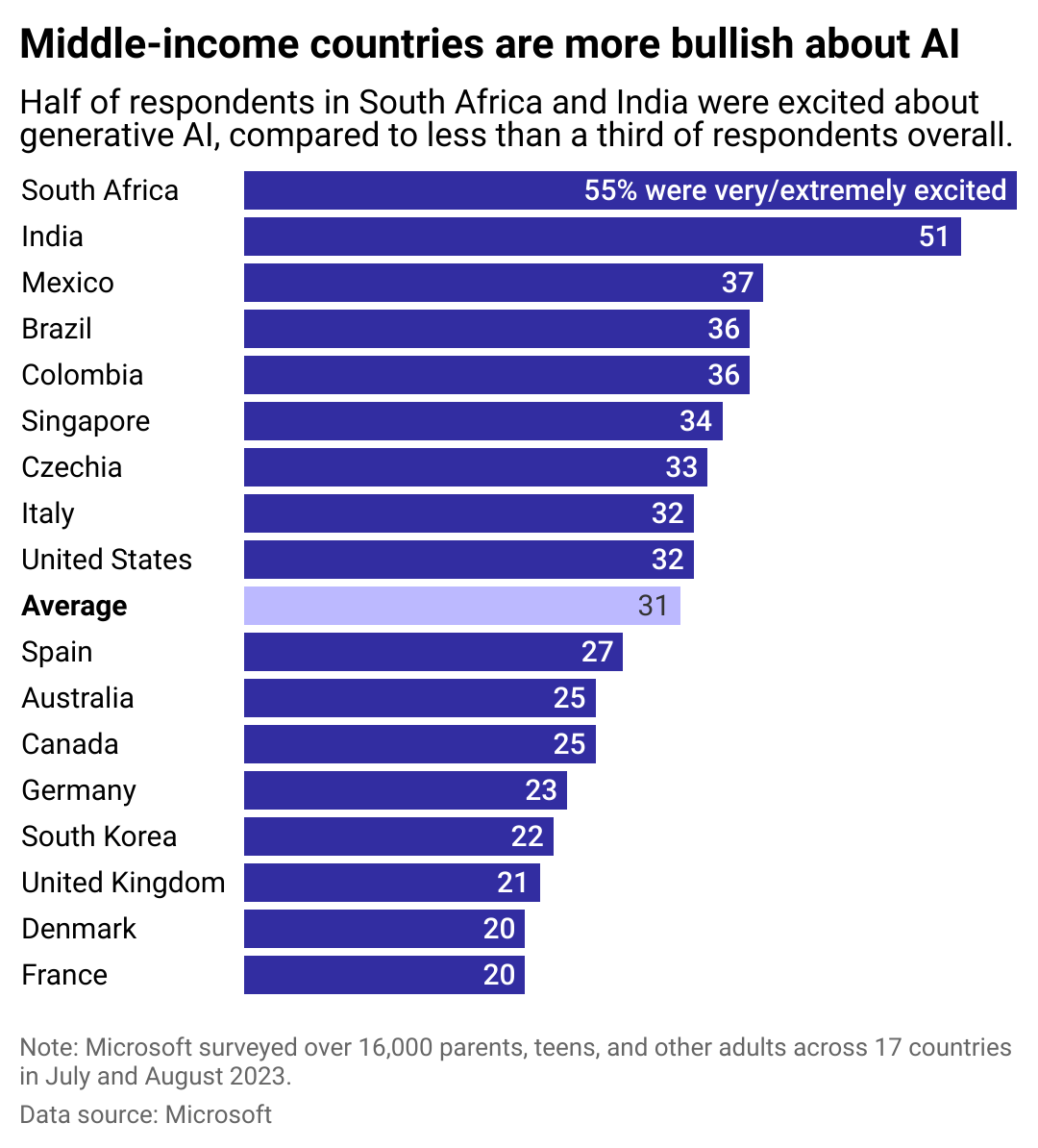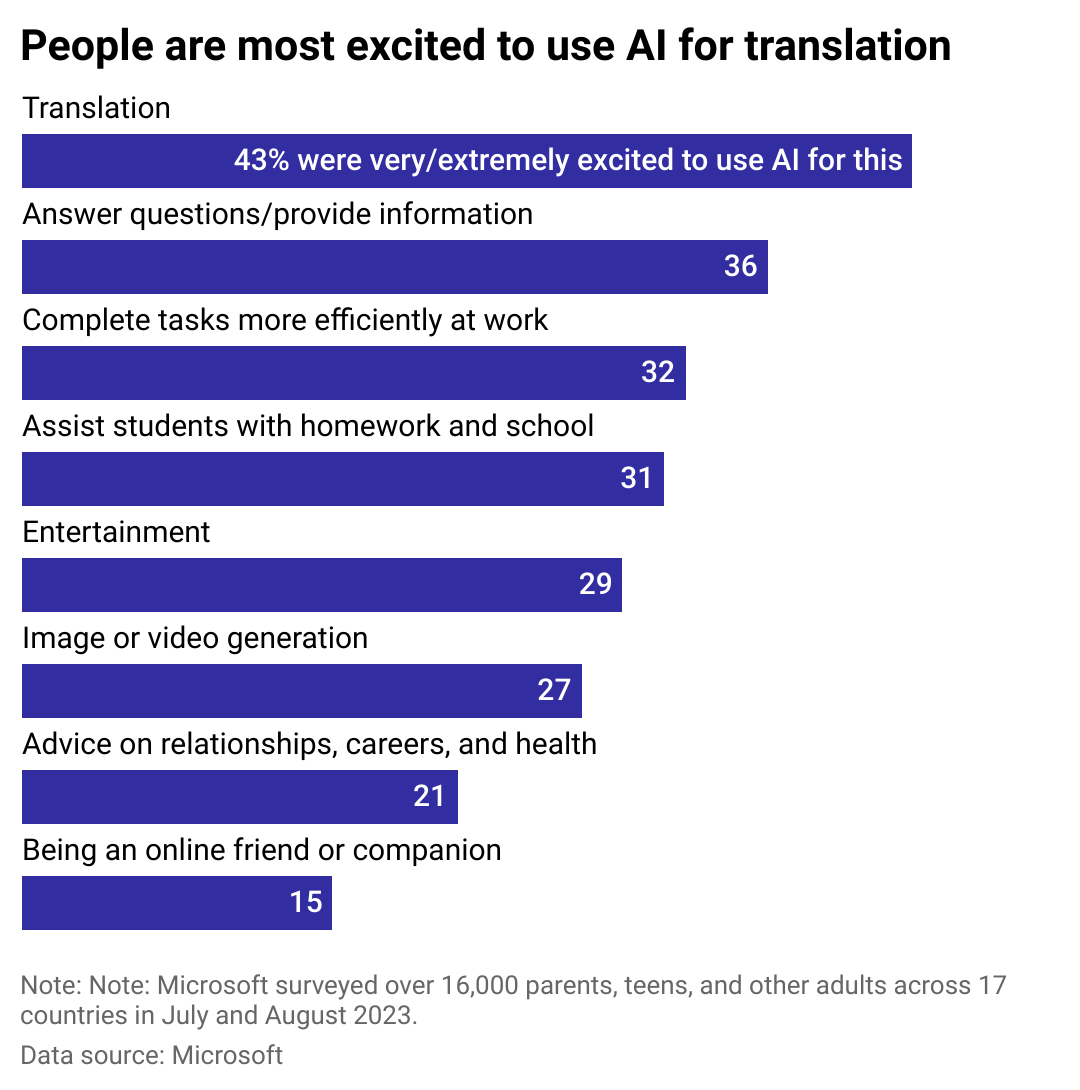From content creation to companionship, here's how people say they hope to use AI

Photo Illustration by Elizabeth Ciano // Stacker // Shutterstock
From content creation to companionship, here’s how people say they hope to use AI
Collage illustration with people using devices.
While it took Facebook 10 months in 2004 to reach 1 million users, ChatGPT had 100 times that reach within five days.
It’s no secret the adoption of new technologies is happening faster and faster—particularly in an era when many cutting-edge innovations come in the form of software. User bases are also increasingly global: Just 15% of visitors to the ChatGPT website are from the United States, according to data from SimilarWeb.
Verbit analyzed Microsoft survey data to determine where in the world people are most enthusiastic about using artificial intelligence and what they hope to use it for. The survey, conducted between July 27 and Aug. 22, 2023, asked more than 16,000 respondents from 17 countries about their attitudes concerning AI.
In general, people from lower-middle and middle-income countries are most optimistic about AI. More than half of respondents in South Africa and India agreed they are “extremely” or “very” excited about using generative AI. Meanwhile, only 2 in 5 respondents in Denmark and France—both considered high-income countries, according to the World Bank—agreed with the sentiment.
Most survey respondents plan to use AI for daily tasks, translation services, and work, with a much smaller percentage seeking out the technology for personal use.
![]()

Verbit
AI is most favored in South Africa and India
A chart showing how enthusiastic people from different countries are about AI, broken down by country. In general, people from middle-income countries were more optimistic than people from richer countries.
One reason people in emerging economies might feel more optimistic about using AI is that it helps level the playing field. Two in 5 (43%) respondents in the Microsoft survey said they were excited to use AI for translation, while 36% said they were excited about using AI to answer questions and provide information.
An overwhelming share of scientific and business materials are written in English, which means AI tools can go a long way in helping people whose first language isn’t English learn about new topics or write documents for work. These tools are also a boon to those in academia (regardless of their first language) and can save significant time authoring studies and other scholarly literature by leveraging AI.
In 2023, ChatGPT usage and similar large language model tools skyrocketed, according to a study (released in 2024) that monitored scholarly literature for keywords known to be popular in AI-generated text—such as “commendable” and “meticulous.” These and other keywords were prevalent across at least 60,000 papers, or just over 1% of all papers that year.
Google has offered its free online translation tool since 2006. The latest wave of AI innovations has pushed the envelope further. Systems similar to ChatGPT are better at understanding the context behind phrases it is asked to translate, which means they can help people not just find words that can fit but ones that a native speaker of the language would use.

Verbit
Companionship and advice received the lowest ranks for AI use
A chart showing what applications people are most excited to use AI for. Lots of people are interested in using AI for translation, but are less enthusiastic about using AI for companionship.
Just 15% of survey respondents said they would use AI for online companionship; 21% plan to tap AI for personal advice.
With the technology still so new, navigating personal connections to AI is a murky process. One chatbot service, Replika, which bills itself as “the AI companion who cares,” drew the ire of its users last year when it updated its software, altering the personalities of some of its bots. Some users had become so attached to their digital companions they believed the software updates amounted to them losing their romantic partners.
The Replika saga illustrates the dangers of becoming too quick to embrace AI systems and underscores why many people fear its use. At least 4 in 5 respondents in each country surveyed agreed they were somewhat worried about people misusing generative AI. One in 7 people surveyed worry that the technology will be used to orchestrate scams, including by impersonating real people. In contrast, a similar share will be used for creating harmful material, such as sexual content.
Modern AI systems are developing quickly, with their full impacts just beginning to emerge. How people leverage the technology is certain to expand and evolve, with the latest data providing the earliest snapshot of what users consider AI’s greatest value-adds.
Story editing by Nicole Caldwell. Copy editing by Paris Close.
This story originally appeared on Verbit and was produced and
distributed in partnership with Stacker Studio.